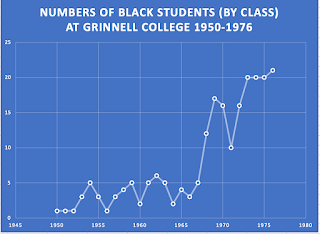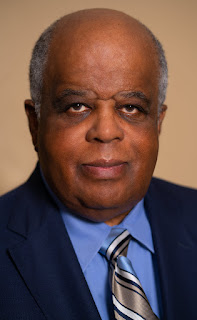The recent Supreme Court ruling on affirmative action has understandably generated much comment. An official statement from Grinnell College took issue with the decision, and pledged to continue to value "diversity, equity and inclusion" as the college moves forward.
 |
| Source: Unofficial Tally by the Author, using Yearbooks, Herd Books, and Other Records |
What may surprise commentators is how far back in the college's history affirmative action goes. No later than immediately after World War I Grinnell College sought funding from the Rosenwald Foundation to enroll and finance Black students, a project that ran out of steam (and money) by 1925. Afterwards only a few Black students enrolled at the College. Then again in 1964, thanks to funding from the Rockefeller Foundation, Grinnell College, along with a handful of other liberal arts institutions, received $275,000 each to help recruit and finance minority students. This initiative, renewed in 1967, led to the first significant increase in Black enrollment at Grinnell College. Today's post examines how this second attempt at affirmative action changed the face of Grinnell College's student population and contributed to a generation of influential Black leaders.
###
In 1964 the Rockefeller Foundation selected seven liberal arts colleges "to discover talented Negro and other minority group students," providing $275,000 each "to improve the quality of [minority students'] undergraduate education." Grinnell was one of the colleges to receive this funding on a three-year trial. "Enduring gains in equality of opportunity for American Negroes and other minority groups in our society depend on improved education at all grade levels and in all parts of the country," the grant announcement said (Rockefeller Archive Center, RF RG.1.7 Series 200, Box 789). A specific ambition was the "improvement of education for those Negroes and other minority group members who are more likely to be...outstanding leaders among their own groups and in the nation. For this purpose special efforts are required to provide enlarged opportunities and increased encouragement for Negro and other students of high potential to benefit from the best that our system of higher education has to offer" (ibid.).
The Foundation announcement observed that the grantee institutions (Antioch, Carleton, Grinnell, Oberlin, Occidental, Reed, and Swarthmore)
have been admitting and assisting Negro students over varying periods of time. All have undertaken in recent years more active programs to identify and enroll talented minority group students. All are allocating increased funds from their own budgets to intensify efforts and to provide the extra level of financial assistance which Negro and other minority group students require to a greater extent than the other students in these colleges. Each of the colleges has approached the Foundation for assistance to enable it to enlarge and intensify its efforts to visit Negro high schools in its area, identify talented students and provide such assistance as is required to assure their full and successful participation in the college. Special emphasis in the program would be devoted to Negroes, but other needy minority group students would not be excluded....The aim of the program at each college would be to increase the flow of Negro and other minority group students through these colleges at outstanding levels of performance and to develop the procedures necessary to attain this objective (ibid.).
The bulk of each Rockefeller Foundation grant ($240,000) went toward student financial assistance at an average level of $2000 a year throughout the four undergraduate years for a total of 30 students recruited during the three years of the trial program. The grants awarded another $35,000 toward increased "efforts to locate and recruit qualified Negro and other minority group students" along with whatever additional programming and counseling might be necessary to guarantee success of the recruited students (ibid.).
A 1967 renewal sent another $275,000 to each of the seven liberal arts colleges. The renewal depended upon the Foundation's finding that the select colleges "have widened their contacts with high schools enrolling many minority-group students," resulting in a "significant" increase in applications from and rising enrollment of "Negro and other minority students. At Grinnell this enrollment has increased since 1964 from seven to fifty-three" (ibid.). The Foundation reported that, despite numerous economic and social disadvantages, the minority recruits, "with very few exceptions,...are succeeding in college, some with excellent records," beginning what officials hoped would be a "growing and permanent flow of minority-group graduates from these colleges" (ibid.).
###
 |
| Edward Tocus (1950 Grinnell College Cyclone) |
 |
| Randall Morgan, Jr. '65 (https://www.thecobbinstitute.org/randall-c-morgan-jr-m-d-m-b-a) |
 |
| Undated Photo of Judge Henry T. Wingate '69 (https://www.grinnell.edu/user/wingate) |
 |
| Undated Photo of Congressman Alan Wheat (U.S. Congress, Public domain, via Wikimedia Commons) (https://en.wikipedia.org/wiki/Alan_Wheat) |
 |
| Undated Photo of Dr. Irma McClaurin (https://irmamcclaurin.com/about/) |
 |
| Undated Photograph of Patricia Swansey '74 (https://mlac.org/staff/) |
Constance Tuck '75 earned a law degree from Cleveland State University, then held several positions with the state of Minnesota, including Chief Equity and Development officer before her 2016 retirement. J. C. Woods '75 is an author and Episcopal priest. Careda Rolland Taylor '76, who received an MA in inner city studies at Northeastern Illinois University, is director of social studies and fine arts at Niles West High School in Skokie. Richard Stokes '76 took a masters in guidance and personnel services from the University of Memphis, then held human resources positions at the University of Tennessee, the Memphis Public Library, and the city of Spring Hill, Tennessee. After a successful career as an executive for BP, Vanessa A. Harris PE '76 became Board Chairman as well as President of Strategy for Access Foundation.
 |
| Undated Photo of Vanessa A. Harris '76 (https://fun4thedisabled.com/about/) ### |
It would be easy to enlarge this list, which I compiled on the basis of a very unsystematic series of Google searches. But what this random selection of alumni careers demonstrates powerfully is that the Black men and women who came to Grinnell through the doors opened and financed by the Rockefeller Foundation initiative—clearly "affirmative action" before this term entered general discourse—have made a difference in their communities and in our world. All of us—white, Black, and brown—are the beneficiaries of the talent and labor that these Black Grinnell graduates brought to the world. Of course, had there been no Rockefeller Foundation initiative, talented Black men and women would have continued to enroll and graduate from Grinnell and from the other institutions involved in the Rockefeller Foundation grant. But the intentional commitment to recruit and finance Black students in the 1960s and 1970s greatly enlarged the number of such graduates and correspondingly expanded their impact in society, benefitting us all.
No comments:
Post a Comment